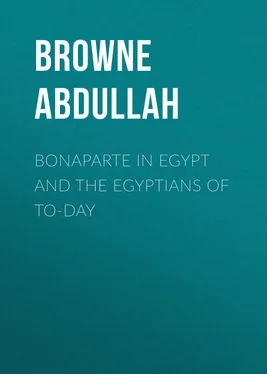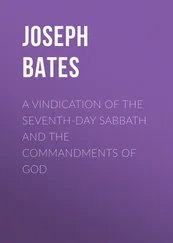Abdullah Browne - Bonaparte in Egypt and the Egyptians of To-day
Здесь есть возможность читать онлайн «Abdullah Browne - Bonaparte in Egypt and the Egyptians of To-day» — ознакомительный отрывок электронной книги совершенно бесплатно, а после прочтения отрывка купить полную версию. В некоторых случаях можно слушать аудио, скачать через торрент в формате fb2 и присутствует краткое содержание. Жанр: Историческая проза, foreign_antique, foreign_prose, foreign_language, на английском языке. Описание произведения, (предисловие) а так же отзывы посетителей доступны на портале библиотеки ЛибКат.
- Название:Bonaparte in Egypt and the Egyptians of To-day
- Автор:
- Жанр:
- Год:неизвестен
- ISBN:нет данных
- Рейтинг книги:4 / 5. Голосов: 1
-
Избранное:Добавить в избранное
- Отзывы:
-
Ваша оценка:
- 80
- 1
- 2
- 3
- 4
- 5
Bonaparte in Egypt and the Egyptians of To-day: краткое содержание, описание и аннотация
Предлагаем к чтению аннотацию, описание, краткое содержание или предисловие (зависит от того, что написал сам автор книги «Bonaparte in Egypt and the Egyptians of To-day»). Если вы не нашли необходимую информацию о книге — напишите в комментариях, мы постараемся отыскать её.
Bonaparte in Egypt and the Egyptians of To-day — читать онлайн ознакомительный отрывок
Ниже представлен текст книги, разбитый по страницам. Система сохранения места последней прочитанной страницы, позволяет с удобством читать онлайн бесплатно книгу «Bonaparte in Egypt and the Egyptians of To-day», без необходимости каждый раз заново искать на чём Вы остановились. Поставьте закладку, и сможете в любой момент перейти на страницу, на которой закончили чтение.
Интервал:
Закладка:
That the Egyptian of to-day is in truth the lineal descendant of those who inhabited the country six thousand years ago is beyond all doubt. Wherever we go in the Nile valley or in the Delta we meet with men and women whose faces and features are living reproductions of the portraits of the kings and people of the most ancient times as sculptured by the artists of their days. And in their habits, manners, and customs, we find to-day striking traces of those that seem to have prevailed when four thousand years before Christ, Ptah-hotep wrote his book of "Instructions," now believed to be the oldest book in the world. And from their building in those far-off ages down to the present day the pyramids, temples, and tombs have stood surviving witnesses of the early greatness of the country, and, though but heedless spectators of its vicissitudes, silent guardians of its departed glory, ever linking its present with its past.
Closely united as the living Egyptian thus is with his earliest ancestors, all the men and almost all the events that preceded the French invasion are as nothing to the Egypt of to-day. Not a single ruler, patriot, statesman, demagogue, artist or author, in short, no man or woman that lived before the dawn of the modern period, has been instrumental in the making of Egypt or the Egyptians what they now are. Persians, Greeks, Romans, Arabs, Turks; all these have held the people in bondage, but their influence never reached below the surface of the life of the country, and has vanished completely with the men upon whom it depended, and though some of these have left monuments, all but imperishable, of their greatness and glory, these to the Egyptians, heirs of their creators, are but idle relics of a forgotten and unheeded past. And as it has been with the men almost so has it been with events, for there are but two of these that, preceding the French invasion, have exercised an influence of such vitality as to survive the great change in the condition of the country that has since been wrought. These two events, with four that belong to the modern period, are indeed all that the whole history of the country presents to us as still clearly and prominently exerting an important and permanent influence upon both the character of the people and the existing circumstances and condition of their country. Of these six events the two that belong to the second period are, the conquest of the land by the Arabs and its subsequent seizure by the Turks. The other four are, the French invasion, the rise of Mahomed Ali, the English occupation and the evacuation of Fachoda by the French.
Each and all of these six events have played important parts in moulding the present-day aspect of Egypt and its people, and the more closely do we study the existing conditions, the more strikingly do these six events stand out from all others as the great and dominating landmarks in the history of modern Egypt. Compared with these all the other incidents of that story of seventy centuries – the long procession of dynasties of Pharaohs, Ptolemies, Caliphs, Sultans, Khedives – are all but shadows that have come and gone. It is not so with the landmarks I have named, for not only are these events that have influenced and are still influencing the thoughts and feelings of the people, but the influence they exert is recognised by the people themselves and must be taken into account in any endeavour either to understand the present condition of the country, or to forecast its future. Although, therefore, the third of these landmarks forms, as we have already seen, the starting-point of the story of modern Egypt, to rightly comprehend that story it is necessary we should have a clear conception of the effects wrought by the first two events and of the influence these have had and still have upon the affairs of the country.
Let us remember here that Egypt, like most civilised countries, has in reality two stories, one the history of the nation as a political body; in other words, its history as history is commonly understood and written, the record of the rise and fall of its rulers, the tale of their triumph and of their failures, and chronicle of their wars, victories, defeats, and all the events that have made or marred their destinies: the other the story of the people themselves, of the growth of their character and institutions, and of the development of their social and moral surroundings. It is with this latter story that we have to deal, and it is, therefore, from the point of view thus assumed that I have estimated the importance of the events of which I have just spoken.
In the history of some countries the two stories, if rightly told, are so interwoven that they become as one, but in the first and second periods of Egyptian history they have scarce anything in common, for so long as the people remained under the rule of the Pharaohs or of the foreigners who succeeded them they were little more than passive victims of the varying fortunes that affected their rulers, and almost the only fluctuations in their state during the long ages stretching from the time of Menes to the French invasion were those occasioned by the varying degrees of the tyranny to which they were subjected. Now and again under some ruler of more humanity or of greater laxity than others their condition may be said to have for the time improved, but such changes were far too slight and their possible duration always far too uncertain for these benefits to be more to the people than as the grateful but passing pleasure a fleeting morning cloud brings to the traveller in a sunburnt desert. Hence, such as the fellaheen or peasantry were when Cheops was building his pyramid, such they remained in almost all respects down to the arrival of the French. The history of the country has, therefore, in the first two periods little to say of the people. In the modern period the two stories touch each other more closely, for in it the people have begun to have a political existence. They have not, indeed, a representative government, and so they have no direct power, but they have a press, the freedom of which is absolutely unrestricted, and they have a "Legislative Council" as a body of elected representatives, through whom, though they cannot control the action of the Government, they are at least able to make their voices heard and their wishes known. More important still, they have begun to comprehend the right of a people to be governed, not only justly, but with a regard to their interests as well as to those of their rulers – a fundamental principle that in the past would have been deemed an unpardonable heresy.
The first step towards the realisation of this improvement, though one for long wholly unproductive of any political benefit to the people, was the Arab conquest, which by the resulting conversion of almost the whole population to the Mahomedan religion, brought about a change still fruitful in its influence upon their ideals and aspirations. To fully describe the importance of this event it would be necessary to enlarge upon the character and tendency of the Mahomedan religion at a length my limits forbid, and I must here therefore content myself with noting that, great as was the moral and mental revolution this conversion occasioned, it was by no means commensurate with that which followed the introduction of Islam into other countries. On the everyday life of the people it seems indeed to have had but little effect other than that of altering their moral standard and modifying in some slight degree their habits and mode of living. It was, perhaps, inevitable that this should be so, for of all the peoples of the East the Egyptians were, and are, the least susceptible of imbibing the spirit that marked the early spread of Islam, gave it the energy that carried it to victory, and still gives it such vitality as it continues to possess. Christianity had been for a long time the State religion of the country, but it seems clear that the great majority of the people were never more than mere nominal followers of the Cross, and the arrival of the Arabs was, therefore, quickly succeeded by the voluntary adoption of Islam by all but the small minority to whom Christianity was something more than a name and whose descendants constitute the Coptic Church of to-day. The political condition of the people was little, if at all, affected by the change in their religion; and consequently, under the Caliphs and their successors, the Egyptian continued to be as he had been before – a man with no higher ambition than that of passing through life with the least possible trouble. From year to year his one prayer was for an abundant Nile and a plentiful crop, not that he might thereby enrich himself, but that he might thereby secure a sufficiency for himself and his family and suffer less from the rapacious tyranny and heartless cruelty of those never-resting oppressors, his rulers and all who, as officials or favourites, were lifted even a little above his own level. It was, and is, of the essence of Islam that it appeals to freemen and favours that love of freedom that is the birthright of every man; but Islam brought no freedom to the Egyptians, save, indeed, the spiritual and moral one their rulers could not rob them of. So such as he had been before, such he remained after the Arab conquest, but with a loftier sense of the dignity of manhood, a nobler conception of life and of its duties, and a stronger faith in a hereafter that should compensate him for all his sufferings and privations in this life. As an individual, therefore, he was somewhat altered, but as a member of the State – if we may apply that term to one who had no political existence save that involved in yielding to his rulers the utmost pennyworth of value they could wrest from him by tyranny and cruelty – he was the same helpless, hopeless, downtrodden being, less valued and less cared for than the beasts in his fields. But the conversion of the Egyptians has filled them with that intense attachment to the faith of Islam that, shared by all Mahomedans, has given rise to the charge of fanaticism so commonly brought against them – a charge that, in the case of the Egyptians, if not wholly unjust, is too often exaggerated, although none the less there is nothing excites the wrathful passions of the people or, in milder moods, sways their actions more than their fidelity to their religion. It is the fact that this is so that renders the Arab conquest the first great landmark in the story of modern Egypt, for it is not too much to say that this attachment of the Egyptians to their faith is to the present day the most important factor with which all who are concerned in the administration of the country have to deal.
Читать дальшеИнтервал:
Закладка:
Похожие книги на «Bonaparte in Egypt and the Egyptians of To-day»
Представляем Вашему вниманию похожие книги на «Bonaparte in Egypt and the Egyptians of To-day» списком для выбора. Мы отобрали схожую по названию и смыслу литературу в надежде предоставить читателям больше вариантов отыскать новые, интересные, ещё непрочитанные произведения.
Обсуждение, отзывы о книге «Bonaparte in Egypt and the Egyptians of To-day» и просто собственные мнения читателей. Оставьте ваши комментарии, напишите, что Вы думаете о произведении, его смысле или главных героях. Укажите что конкретно понравилось, а что нет, и почему Вы так считаете.












